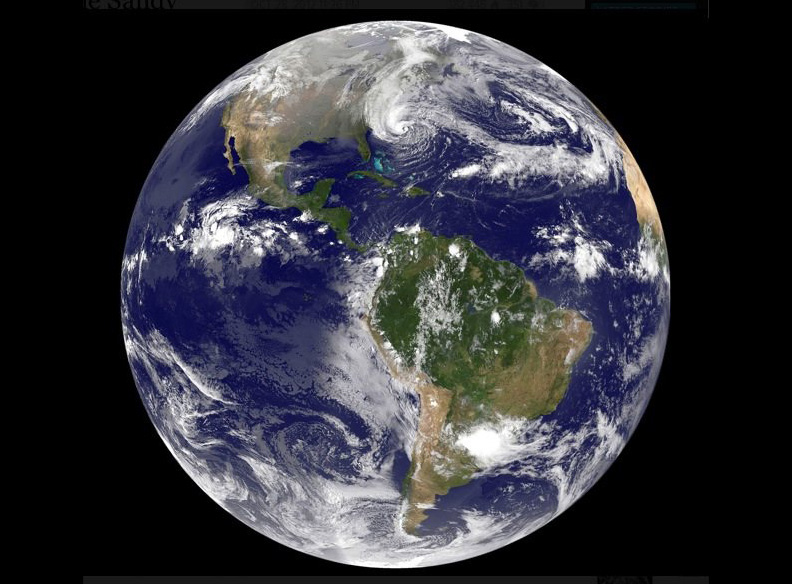
The election has come and gone. And, as many green-minded Americans have pointed out, up to the last week, the environment was a non-topic in most of the political discussion. Climate change was never mentioned in the presidential debates by either candidate; sustainability didn’t merit a single debate question. Environmentalists across the country seem pleased that the American people elected the candidate who cares more about the environment. But the question remains: is “more” enough when the alternative is almost nothing?
Superstorm Sandy, striking U.S. shores so close to election time, certainly brought the environment to the forefront of the political landscape. Obama received a key endorsement from Mayor Michael Bloomberg which is notable not so much for it’s existence (Bloomberg, as a fairly liberal independent, likely would have leaned towards Obama regardless of the storm) as for it’s timing. Bloomberg endorsed Obama as a result of the storm, citing the president’s recognition of climate change and commitment to a reduction of our national carbon consumption as reasons for his endorsement.
[Read Dieter Helms in the NYT on why a price on carbon is the answer to all our troubles.]
It is hard to gauge how much the storm swayed voters one way or the other, but the fact that it at least underscored the issue of climate change is undeniable. In a poignant and at times troubling opinion piece, Tina Rosenberg of the NewYork Times indicates that a change in the national apathy towards climate change may already be underway, especially after the recent bout of devastating weather:
“This year, the extreme weather began to change American views again — even before Hurricane Sandy. Numerous surveys — here’s one from George Mason and Yale universities— show that Americans now overwhelmingly believe climate change is real and caused by humans, and that it threatens people in the United States. Another survey by the same organizations found that a political position in favor of climate action wins votes among Democratic and Independent voters, and does little harm with Republican voters.” [NYT, 11/7/12]
Recognition of climate change seems to be gaining traction, and our mayor has made it clear that the environment is a major priority of his, so much so that it seemed to singlehandedly decide his presidential vote. Not all politicians may yet be talking about or even accepting climate change, but the dire circumstances of our environment are becoming an increasingly important issue across the country. With our mayor’s help and leadership, New Yorkers have an opportunity to lead the U.S. in thinking about and responding to climate change.
A week after the storm, President Obama mentioned climate change in his election night acceptance speech. As Paul M. Barrett of Bloomberg Businessweek points out, Obama made reference to the idea that we are “threatened by the destructive power of a warming planet.” Barrett questions whether this ‘passing mention’ is enough. Will Obama stand behind his words and act on this threat? Time will tell – but the fact that he mentioned climate change in his victory speech should establish a benchmark for his second term.
After a deluge that arrived just prior to a presidential election, climate change has crashed back into the country’s political conversation. Here’s to hoping that this timing leads to legitimate change, so that some good can come from this tragedy of a storm. What we can do as citizens is hold our elected officials to their word: once they are willing to accept the fear of climate change, we must demand that they also be willing to act on this fear, and to respond by leading us all in the direction of a sustainable future.
Below is an excerpt from Mayor Bloomberg’s speech endorsing President Obama and citing climate change as the reason for his endorsement.
The devastation that Hurricane Sandy brought to New York City and much of the Northeast—in lost lives, lost homes and lost business—brought the stakes of Tuesday’s presidential election into sharp relief.
The floods and fires that swept through our city left a path of destruction that will require years of recovery and rebuilding work. And in the short term, our subway system remains partially shut down, and many city residents and businesses still have no power. In just 14 months, two hurricanes have forced us to evacuate neighborhoods—something our city government had never done before. If this is a trend, it is simply not sustainable.
Our climate is changing. And while the increase in extreme weather we have experienced in New York City and around the world may or may not be the result of it, the risk that it might be—given this week’s devastation—should compel all elected leaders to take immediate action.
-Mayor Michael Bloomberg
___
[In a related piece in the New York Times, Monday 11/12, Bill Keller reviews the ideas for protecting the city and suggests Mayor Bloomberg move into the role of overseer, once his term as mayor is up.]